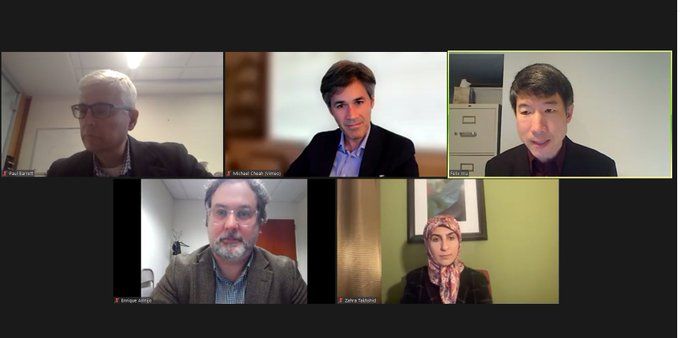
“25 Years of Section 230: Retain, Reform or Repeal," hosted by Cardozo’s Arts and Entertainment Law Journal, was held March 31. The event focused on the law which is a section of Title 47 of the United States Code, enacted as part of the US Communications Decency Act, that generally provides immunity for website platforms with respect to third party content.
Professor Christopher Buccafusco, director of Cardozo's IP and Information Law Program, gave the opening remarks and said, “Section 230 is the law that provides immunity for Internet service providers from the activities of their users. It allows ISPs to engage in good faith moderation of their platforms-and it’s the law that everyone loves to hate."
This sentiment was echoed throughout the symposium, with panelists discussing why it's such a controversial topic. Jeff Kosseff, Associate Professor of Cybersecurity Law, United States Naval Academy, was the keynote speaker and started the symposium by describing the history of Section 230. "What do we want the Internet to look like?” he said. “I think we're really far apart on that. The second question is: how do we get there? I think Section 230 is too often seen as a way to fix the Internet."
Both panels were moderated by Professor Felix Wu, the faculty director of Cardozo's Data Law Initiative. The first panel included Mary Graw Leary, Professor of Law & Senior Associate Dean, The Catholic University of America; Kendra Albert, Clinical Instructor, Cyberlaw Clinic, Harvard Law School; and Carrie Goldberg, Founder, C.A. Goldberg, PLLC. Leary focused on carving out immunity from Section 230 for child sexual abuse material ("CSAM") and Albert spoke about "FOSTA-SESTA." Goldberg described her lawsuit against Omegle and pursuing the legislative change of "safe tech," which legislates content-based harm.
Leary said, "Bottom line is Section 230, in my view and in many peoples' views, has to be amended. The question is how, and these are big debates. The easy question is with CSAM (child sexual abuse material). Section 230 gives no incentive for these platforms to take it off and without a doubt, we are in a different world than 1996 and the promises made to us then have failed."
Panel two included Zahra Takhshid, Assistant Professor of Law, University of Denver Sturm College of Law; Enrique Armijo, Professor of Law, Elon University School of Law; Michael A. Cheah, General Counsel, Vimeo & Adjunct Professor of Law, University of Miami Law School; and Paul M. Barrett, Senior Research Scholar and Deputy Director, NYU Stern Center for Business and Human Rights & Adjunct Professor of Law, NYU School of Law.
Barrett commented, "My proposal is to have lawmakers make clear that the FTC’s consumer protection authority should be used more vigorously to provide oversight to the social media industry. Funds and personnel would be needed. Then, Congress ought to clarify two broad areas: first is the authority to provide procedurally adequate content moderation systems. Strong emphasis on the word procedural–content policies, enforcement mechanisms, and opportunities for appeal. Critically, also adequate resources for implementing content moderation systems. The second component is transparency of data that is currently secret, including algorithms that remove content, requiring them to describe to some degree what factors go into algorithms. I think Section 230 can be constructively curtailed.”
This content was contributed by 3L student Madison Marlow, Staff Editor of the Cardozo Arts & Entertainment Law Journal.
